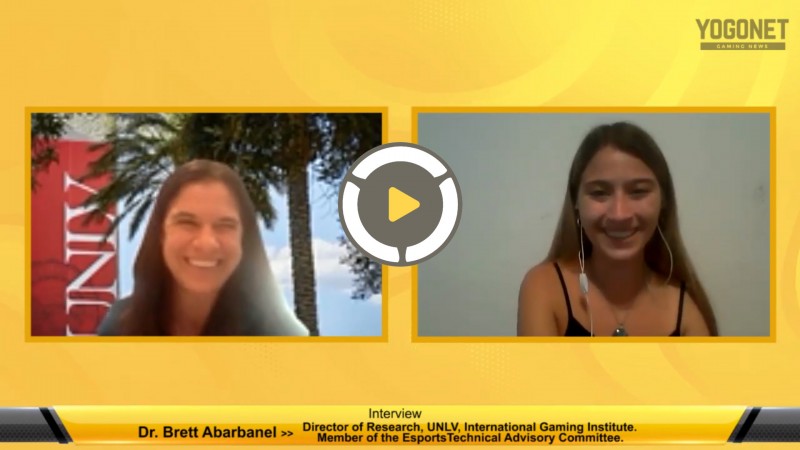
After the announcement of the establishment of a new eSports Technical Advisory Committee in Nevada, Yogonet spoke with one of its newly appointed members, Dr. Brett Abarbanel, Director of Research for the UNLV, International Gaming Institute, who provided an accurate description of the current panorama of eSports gambling and the reasons for the creation of this new committee.
“Now there’s so many different ways in which people can interact and, in this sense, then place these kinds of wagers, whether that be through interaction with events, through interaction with other gamblers, with a gambling operator themselves. This has continued to grow, and it really has only grown in a more exponential manner since COVID hit”, Abarbanel explained in a video interview. “And it’s become something that’s much more common and consumable as we would have even thought of in February of 2020.”
“When we talk about eSports, we’re talking about competition and spectatorship of competition, like the highest echelons of eSports are these things like the League of Legends Championship Series or Major ESL events. But they also have a massive land or local area network that they set up where anybody can come and play and compete against one another. And then as we continue to break that down further, then we start getting into things where we’re really looking at the games themselves and not necessarily competition on those games. And so within that whole spectrum, we see gambling get involved in different ways”.
Esports have also been integrating into gaming floors over the past years, through skill-based games, making it “familiar from the gambling industry to see how games might be integrated and how the line blurs there, because those bring in elements of video games to a chance-based machine”.
In the face of this exponential growth, the Esports Technical Advisory Committee was created after the amendment of a new Esports Regulatory Commission proposal, crafted based on the existing Nevada Athletic Commission. To Abarbanel, the changes that the original idea suffered in the creation of the Committee bring both limitations as well as opportunities.
“Some of the pros, for example, are kind of a keener, more intense oversight on things like integrity issues. But some of the cons mean that there are a lot of additional steps involved, and actually having an event like that in Nevada”, she explained, and pointed out some inconveniences such as incurred paperwork and costs, among other issues.
“A Committee like this is a little bit more flexible in the sense that it can be more open about recommendations, as opposed to trying to come up with very strict guidelines as to how an event might need to take place. And I hope that that really provides for a very collaborative environment”.
When it comes to regulating and further broadening this expanding world, Brett Abarbanel pointed out the difficulties that this ever-evolving space brings about; and understands that there are no static recommendations for these practices. Being one of the main issues, cybersecurity is one of the problems for the Committee to tackle, as well as integrity.
“When we bring that gambling piece to eSports, it means we’re really addressing some of those natural weak points. When we talk about gambling, often what ends up happening is people get very concerned that that’s going to bring about major issues like match-fixing and general fixing of games. The best practice would be to set up a world or an operation in which that confidence is there, that bringing gambling in and having gambling available isn’t going to bring with it crime and lack of integrity”.
“If we think about this from the gambling side of things, the integrity of gambling is completely reliant on the integrity of the game. So there’s a massive vested interest in gambling entities to ensure that that’s also available in the competition” she added.
Both in terms of integration and integrity, Brett Abarbanel considers that the approach should be considered from a holistic point of view.
“A good way to integrate e-sports into these casinos is to recognize what you have as a gambling industry, and what you have as a gambling operator, and differentiate yourself from these pieces that carry quite a lot of controversy. Are there different things that you can provide that are particularly attractive to your target audience? Can you provide unique consumer protection measures so things like responsible gambling are different in an eSports and video games world than they might be in a more traditional casino world? And all of these different things have to be considered as eSports are brought into play”.
“It has to be more holistic than kind of this piecemeal ‘Ok, I’ll see if maybe if I put an EA Sports lounge in, maybe people will come and then they’ll go over to the slot machines’. We’ve seen from different experiments in different places, but that’s not particularly successful. It has to be a little bit more integrated within the space that’s there, and the space that’s there has to develop and evolve a little more to accommodate new interests”.
The streaming world has bridged gaps in the gaming world that involve gender and age issues, and it has reached a heterogenic audience.
“There’s now this ability to have wagering capability tied to the streams. And so we have this opportunity to really connect with gamblers in a way that we haven’t before, which again, opens up incredible opportunities, not just in terms of the product mix, but also in terms of consumer protection. We can reach people where they are”, Abarbanel explained.
As eSports has a constant barrage of events going on at the same time, there are many in-game events on which bets can be placed. “We’re starting to see this also exists in what might not be defined as legally gambling spaces”, Abarbanel highlighted. “We’ve got young young kids here and I don’t mean like teenagers. I mean, like five year olds watching some of these matches. These different types of non gambling wagers do exist, and it is in the element that does exist for kids. And so I think that that’s something that will also come into play as we talk about the different components of consumer protection too”.
The Esports Technical Advisory Committee consists of seven industry professionals, including:
-
Brett Abarbanel, Director of Research, International Gaming Institute at University of Nevada, Las Vegas
-
Paul Hamilton, Co-Owner & CEO, Atlanta Esports Ventures
-
Seth Schorr, CEO, Fifth Street Gaming
-
Lovell Walker, Vice President of Development, Penn National Gaming
-
Christian Bishop, Chief Revenue Officer, Method
-
Jud Hannigan, CEO, Allied Esports
-
Brandon Snow, Head of Esports, Activision Blizzard
Newly-appointed committees will maintain their positions until November 2024. Current regulation in Nevada authorizes esports betting on a per-event basis. This requires operators to submit an application to the Gaming Control Board for vetting and approval for each competition.
Abarbanel said the Committee still does not have a scheduled date for its first meeting, though she expects it will be early next year.
Original article: https://www.yogonet.com/international/news/2021/12/16/60632–34there-are-no-static-recommendations-to-regulate-esports-betting-34















